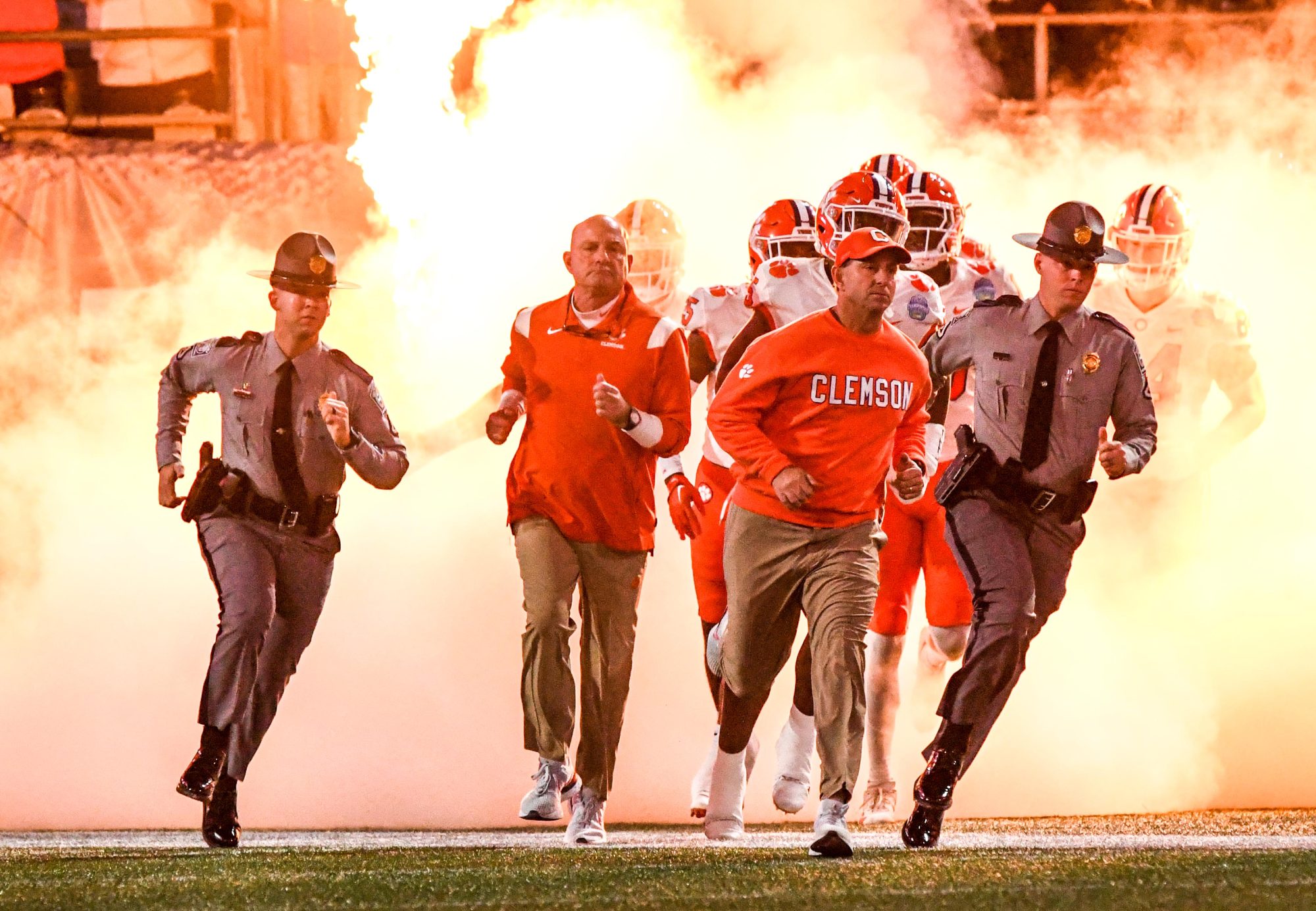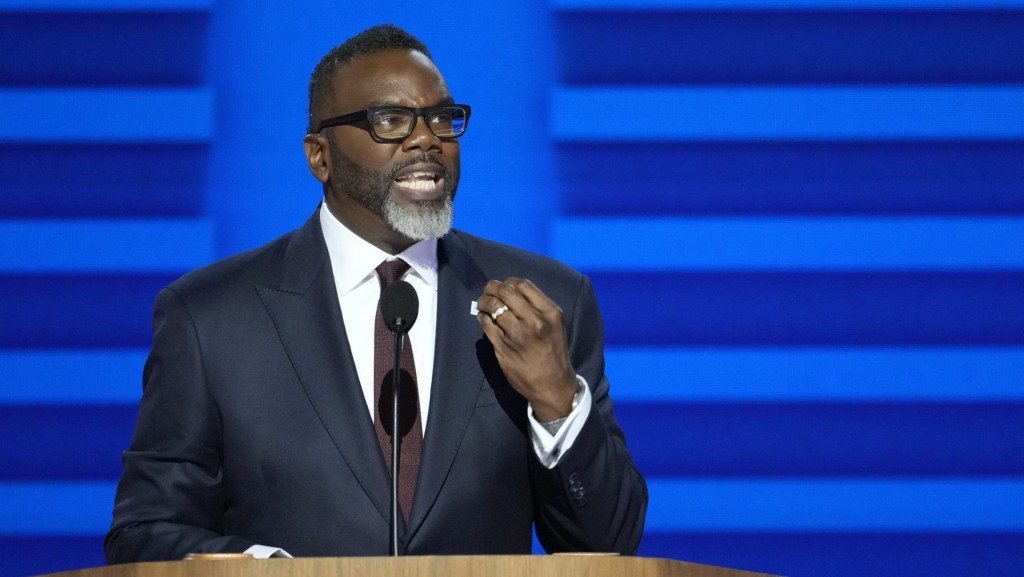Last month, during the first round of the NCAA men’s basketball tournament, ACC commissioner Jim Phillips sat beside Clemson athletic director Graham Neff. In a normal year, this situation would be standard operating procedure: The pair, likely assigned to this seating arrangement by the NCAA, might be sharing small talk and celebration as the Tigers beat New Mexico 77-56. After all, their first win—in what would become an Elite Eight run—was good for both the conference’s image and its finances, thanks to the tournament prize money system referred to as “units.”
But, nearly a year removed from last summer’s major wave of realignment, the vibe was decidedly icy. The two did little more than acknowledge each other’s presence when Neff sat down midway through the first half; otherwise, they “weren’t particularly chatty,” according to one reporter on the ground. Another reporter likened the scene to a botched wedding seating chart. Neff got up at halftime and never returned.
That prickly dynamic was the result of a rather significant off-court dispute: Clemson is suing the ACC, following the lead of Florida State, which filed a similar lawsuit in December. Their goal: prove that the contracts binding them to the conference aren’t enforceable, winning them the right to leave. The ACC, meanwhile, is counter-suing both schools in a court in North Carolina, like a domestic partner making a last-ditch effort to save a relationship.
Here is everything you need to know about the four lawsuits that could break the ACC apart:
Slow down a second. I don’t remember lawsuits from last summer’s realignment. Why is this different?
Conferences generally have two marriage contracts: a media rights deal and a “grant of rights,” which allows the conference to sell media inventory for the schools on their behalf. Schools looking to depart their current conferences generally have two options: wait until these contracts expire, or pay the exit fees.
The Pac-12, for example, broke apart because its previous media contract was up at the end of the 2023-24 season. Most of the schools refused to sign the deal they were offered (as well as the GoR that goes with it), so they were free to go. The Big 12, on the other hand, negotiated a deal with Texas and Oklahoma to allow them to leave the conference a year early, before their previous GoR expired in 2025.
ACC schools don’t have that same flexibility. The ACC’s contract goes for another 12 years, until 2036—several lifetimes in the rapidly evolving college sports landscape. And the exit fees are much more expensive than they are for any other conference. (Think: adding at least an extra zero.)
Who started this gaggle of lawsuits?
Technically, the first one was the ACC’s complaint against Florida State, filed on Dec. 22 in Mecklenburg County, N.C. But that was filed in anticipation of FSU’s lawsuit, which appeared in a Leon County, Fla., court the following day. The ACC was fully aware that FSU was planning its own lawsuit—as was the rest of the internet. University officials suggested it in a public board meeting announcement earlier that week.
Clemson filed a complaint three months later, on March 19, in Pickens County, S.C. The ACC followed up with a countersuit the following day, also in Mecklenburg County.
Why now?
Schools like FSU and Clemson have witnessed other conferences wheel and deal to add new valuable members and increase their media rights fees (like the Big Ten and SEC “super leagues”).
FSU, in fact, had been considering for over a year whether or not to sue to get out of the ACC. FSU has accused its conference of shirking its contractual obligations by mishandling media rights negotiations and conference realignment over the past several years, dooming the conference to fall significantly behind its competitors financially. The last straw, however, was the most notable: In December, FSU failed to secure a spot in the College Football Playoff, despite going undefeated, while one-loss Alabama locked down the final spot—a move that was largely credited to its SEC affiliation.
After FSU put its foot down and sued in December, it was only a matter of time before Clemson followed that lead.
Are Clemson’s and FSU’s arguments the same?
Not exactly.
FSU’s complaint includes multiple arguments demonstrating the conference’s general negligence (a Seinfeld-esque “airing of grievances,” as I wrote in December). But it focuses specifically on the enforceability of the grant of rights and the interpretation of the multi-decade media contract with ESPN. The GoR, which FSU called “draconian,” would require a $572 million payout, including a $140 million exit fee, to leave the conference before it expires in 2036. FSU also argued that the ACC misinterpreted the media contract with ESPN.
Clemson’s lawsuit appears to be somewhat less accusatory, as it only echoes FSU’s sentiments about the GoR. It doesn’t include a referendum on the conference’s failures as a whole.
You mentioned countersuits. What’s the ACC’s game plan?
Hoping for a home-field advantage, the ACC filed counter-lawsuits against both schools in North Carolina. (The conference has jurisdiction in the state, and its headquarters are in Charlotte.)
FSU will potentially have the sympathy of a local Florida court judge in its lawsuit. Same goes for Clemson in South Carolina. The ACC is hoping that its countersuits will not only provide a friendlier venue, but ultimately end up halting the lawsuits in the schools’ states. Even if those attempts fail, the ACC could at least set a precedent for litigating contracts in any state where the conference operates.
This practice is a slippery slope, however. The judge in the FSU-ACC case accused the conference of “forum shopping” during a hearing last week. While not illegal, the practice is frowned upon by judges in many cases.
Many of us readers aren’t lawyers. How exactly could these lawsuits cause the breakup of the conference?
If FSU and Clemson prevail in court and invalidate the GoR, they would break the bond holding the league together. The schools would be able to take back the rights to broadcasting their own games. And, most importantly, they wouldn’t have to worry about coughing up nine-figure exit fees to find a new home.
But finding a new conference is much like finding a new partner: You might end up staying in your current relationship, even if it’s not perfect—especially if you can’t find anyone else. (FSU has been vocal about its interest in joining the SEC, for example, but the SEC hasn’t appeared interested in courting them.)
But at that point, ACC HQ would have no control over its own fate.
You mentioned ESPN, which probably has invested several millions in the ACC as its media rightsholder. Surely they have something to say on this all.
In fact, they do. ESPN, which has invested hundreds of millions into the conference, has not taken a public position on the main questions in the lawsuit. But it agrees with the ACC on one thing: It wants the terms of its media contracts, discussed in all the lawsuits, to remain private.
Through a glitzy, New York City-based “big law” firm called Cravath, ESPN filed a brief asking the court to seal the contents of its agreements from the public. That 17-page document suggests that the contracts include “trade secrets,” and that FSU may have even committed a felony by disclosing some information about the terms already. The motion was generally successful, with a few exceptions.
When Clemson filed its lawsuit a month later, it heeded ESPN’s warning by filing a redacted complaint.
So, what’s next? And how long will this take?
On Monday morning in Florida, a judge will hear arguments about whether to dismiss the FSU v. ACC case and, as a result, let the North Carolina countersuit go forward instead.
It’s unclear how long these cases could take, as there’s always a chance for a settlement. But at this point, we don’t even know which of the four lawsuits could yield a decision that would be considered precedent.
Both schools appear to be potential fits for the SEC—though, as I mentioned, the Super League would have to extend those invitations. Unlike FSU, which has voiced its desire to leave the ACC, Clemson has clarified in public comments that it just wants to explore the option.
In the meantime, the conference is preparing to welcome Stanford, Cal, and SMU next season as part of a seismic wave of realignment that Clemson and FSU wish they were participating in.







![[Subscription Customers Only] Jun 15, 2025; Seattle, Washington, USA; Botafogo owner John Textor inside the stadium before the match during a group stage match of the 2025 FIFA Club World Cup at Lumen Field.](https://frontofficesports.com/wp-content/uploads/2026/02/USATSI_26465842_168416386_lowres-scaled.jpg?quality=100&w=1024)
![[Subscription Customers Only] Jul 13, 2025; East Rutherford, New Jersey, USA; Chelsea FC midfielder Cole Palmer (10) celebrates winning the final of the 2025 FIFA Club World Cup at MetLife Stadium](https://frontofficesports.com/wp-content/uploads/2026/02/USATSI_26636703-scaled-e1770932227605.jpg?quality=100&w=1024)









